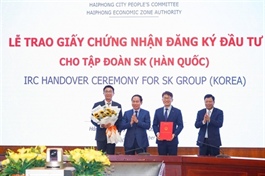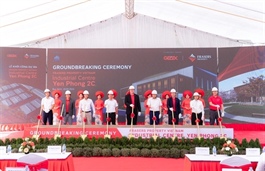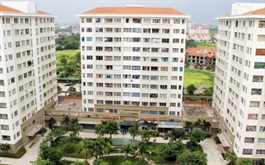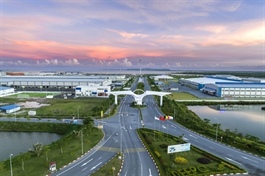Phuc Khang applies green building standards to reduce carbon emissions
Phuc Khang applies green building standards to reduce carbon emissions
Phuc Khang Corporation (PKC) paid early attention to green construction. The projects invested and developed by the business aim to optimise energy consumption, reduce carbon emissions, and benefit the environment.

To date, carbon emissions from building operations have reached an all-time high of around 10 gigatons of CO2. This figure is an increase of about 5 per cent compared to 2020 and 2 per cent higher than the previous peak in 2019.
Therefore, reducing carbon emissions in construction projects plays an essential role in achieving an overall reduction. The World Green Building Council (WGBC) has developed a vision and action framework up to 2030.
In particular, all newly built construction projects must have zero operational carbon and reduce their associated energy by 40 per cent in terms of embodied carbon. By 2050, all buildings (both existing and new) must achieve-zero operational carbon, with new constructions having to achieve zero carbon content. Measured over the entire life cycle of the building, a zero-carbon construction is one with zero operating and zero embodied carbon.
To have a zero-carbon building, it is necessary to prioritise high-efficiency solutions and provide all the building's energy needs with renewable energy.
To have a project with zero carbon content, it is necessary to minimise carbon content as much as possible by renovating the building and replacing construction materials, as well as mitigating the remaining amount by exchanging carbon credits. According to the WGBC, a figure of less than 10 per cent of carbon emissions is required to be classified as net-zero.
In Vietnam, Decree No.06/2022/ND-CP dated January 2022 includes regulations on protecting the ozone layer and minimising greenhouse gas (GHG) emissions.
Vietnam targets a reduction of 563.8 million tons of CO2 equivalent (CO2eq) by 2030. Of which, the Ministry of Construction's GHG emission reduction target is 74.3 million tons of CO2eq in all process from industrial manufacturing and cement production, to construction and operations.
Decree 06 also regulates that GHG-emitting facilities must carry out a GHG inventory. This means that businesses and commercial buildings will have their GHG emissions controlled. Therefore, firms must soon make changes to meet new requirements. In cases where the emissions exceed the allowed quota, businesses can choose an alternative solution through exchanging carbon credits on the market.
From the general trends and strategies above, being able to attract green capital into real estate requires green products and projects. Thus, the carbon credit market will be a driving force for real estate development.
In this context, real estate businesses can proactively transform and pioneer in participating in the carbon credit market by producing products aimed at net-zero carbon criteria.
In recent years, Vietnam has issued legal frameworks and policies to form carbon markets through decrees, decisions, and circulars. In particular, the Ministry of Natural Resources and Environment has developed a draft project based on Decision 06 named Developing the carbon market in Vietnam.
PKC, with its orientation as a green building developer, soon after its foundation in 2009 had launched the mission on pioneering the creation of a better lifestyle for public health and a sustainable humanistic ecological environment according to global green standards.
PKC has mapped out different strategies to reduce carbon emissions, such as the commitment to apply green building standards to all real estate projects developed by the company, including LEED, LOTUS, EDGE, and Green Mark standards.
This strategy is applied according to appropriate types and segments of projects, aiming to apply green standards to all new urban areas that PKC develops.
Raising environmental awareness, especially on forest protection, and using renewable energy are top priorities for PKC. The company is committed to using wood that has a clear origin according to the standards of the Forest Stewardship Council, and solar power is set to play a significant role in meeting its energy needs.
Solar power systems are being designed and constructed on the roofs of projects, employee parking lots, and public areas of PKC's projects.
PKC has also increased investment in clean technology and smart and automated management systems. These systems are installed at all projects to optimise the building's energy consumption. These include automatic sensor systems that turn lights on and off, inverter air conditioning systems, automatic watering systems, and many others.
To reduce emissions from industrial production procedures, PKC's top priority is to use local construction materials to reduce energy consumption related to transportation. Specifically, PKC prioritises using materials such as unburnt bricks to reduce GHG emissions rather than the currently fired bricks.



























